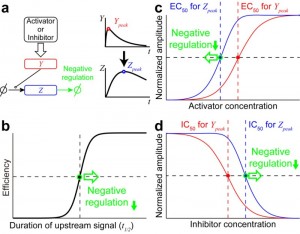Analysis of sensitivity control through signal transduction Mechanisms for controlling sensitivity of drug response

Professor Shinya Kuroda and his colleagues at the Department of Biophysics and Biochemistry in the University of Tokyo’s Graduate School of Science have analyzed how the signalling pathway controls drug sensitivity.

The effective dose of a drug required to induce a cellular response is termed sensitivity and is an important hallmark of biological and pharmacological responses. However, the principles controlling sensitivity remain unclear. For example, even if a drug effectively inhibits its target molecule, biological output may not necessarily be controlled and a higher dose of the drug may be needed.
By integrating theoretical analyses and biological experiments, Kuroda’s group found that negative regulation of the signalling pathway, including degradation and deactivation of signalling molecules, controls the sensitivity of the pathway.
This mechanism can explain why a higher dose of the drug is needed to inhibit cellular responses than is needed to inhibit the drug’s target molecule, and is expected to be useful for predictions of drug responses and designing new drugs. These new findings were published in the journal Nature Communications electronic edition.
Paper
Yu Toyoshima, Hiroaki Kakuda, Kazuhiro A. Fujita, Shinsuke Uda & Shinya Kuroda,
“Sensitivity control through attenuation of signal transfer efficiency by negative regulation of cellular signalling”,
Nature Communications, 3:743, (2012):1-8, doi:10.1038/ncomms1745
Article link.







